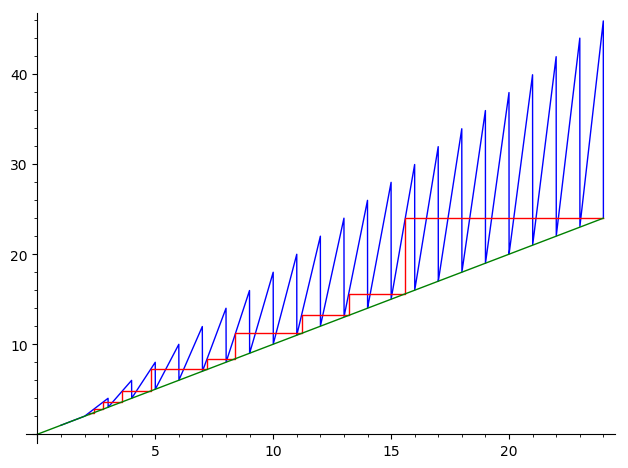Remark: It is true for $u_0=\frac{p}{q}$ with $p \le 32000$$p \le 40000$ (see Appendix).
sage: search(3206440120)
[1, (2, 1)]
[2, (5, 2)]
[3, (7, 2)]
[4, (7, 3)]
[11, (11, 5)]
[30, (15, 7)]
[31, (29, 14)]
[45, (37, 17)]
[53, (39, 17)]
[124, (41, 19)]
[167, (59, 29)]
[168, (117, 58)]
[358, (123, 53)]
[380, (183, 89)]
[381, (201, 89)]
[530, (209, 97)]
[532, (221, 97)]
[622, (285, 131)]
[624, (295, 131)]
[921, (359, 167)]
[1233, (383, 181)]
[1365, (517, 251)]
[1482, (541, 269)]
[2532, (583, 263)]
[3121, (805, 389)]
[3586, (1197, 587)]
[3608, (1237, 607)]
[3860, (1263, 617)]
[4160, (1425, 643)]
[6056, (1487, 743)]
[9658, (1875, 859)]
[9662, (1933, 859)]
[10467, (2519, 1213)]
[10534, (2805, 1289)]
[11843, (2927, 1423)]
[12563, (3169, 1583)]
[13523, (3535, 1637)]
[14004, (3771, 1871)]
[14461, (4147, 2011)]
[17485, (4227, 1709)]
[18193, (4641, 1987)]
[18978, (4711, 2347)]
[22680, (5193, 2377)]
[23742, (5415, 2707)]
[24582, (5711, 2663)]
[27786, (5789, 2837)]
[27869, (6275, 2969)]
[29168, (6523, 3229)]
[32485, (6753, 2917)]
[33819, (7203, 3361)]
[41710, (7801, 3719)]
[49402, (8357, 3863)]
[58254, (10307, 4513)]
[58700, (10957, 4943)]
[81773, (12159, 5659)]
[85815, (16335, 7963)]
[91298, (16543, 7517)]
[91300, (17179, 7517)]
[98102, (19133, 9437)]
[100315, (19587, 8893)]
[100319, (20037, 8893)]
[102230, (20091, 9749)]
[102707, (21289, 10267)]
[103894, (21511, 10151)]
[105508, (22439, 11149)]
[107715, (22565, 10729)]
[142580, (23049, 11257)]
[154265, (24915, 12007)]
[177616, (27461, 13421)]
[178421, (32063, 15377)]
[190758, (34141, 16547)]
[228068, (34783, 15473)]
[228876, (35515, 17477)]
[277844, (40119, 19391)]

